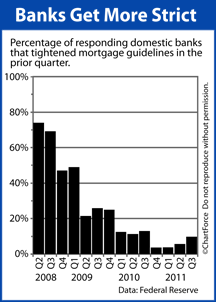
As part of its quarterly survey to member banks nationwide, the Federal Reserve asked senior loan officers whether last quarter’s “prime” residential mortgage guidelines have tightened, loosened, or remained as-is.
A “prime” borrower is defined as one with a well-documented, high-performance credit history; with low debt-to-income ratios; and who chooses to finance a home via a traditional fixed-rate or adjustable-rate mortgage product.
After a 2-year easing cycle, the nation’s biggest bank banks report that they’ve reversed course, and are raising the bar on mortgage approvals.
For the period July-September 2010, 88% of responding loan officers admitted to tightening their prime guidelines, or leaving them “basically unchanged”.
If you’ve applied for a home loan of late, you’ve experienced this first-hand.
High delinquency rates and defaults since 2007 have caused the banks to rethink what they will lend, and to whom. As a result, today’s mortgage lenders scrutinize assets, incomes, and credit scores to make sure that nothing “slips by”.
For today’s home buyers and would-be refinancers, the mortgage approval process can be challenging as compared to how it looked just 18 months ago.
- Minimum credit scores requirements are higher today
- Downpayment/equity requirements are larger today
- Debt-to-Income ratio requirements are more strict today
In other words, although mortgage rates are the lowest that they’ve been in history, fewer applicants can qualify. And, with more the housing market still in recovery, it’s likely that guidelines will tighten again in 2012.
Therefore, if you’re among the many people in Louisville wondering if it’s the right time to buy a home or refinance, consider that, although mortgage rates may fall, approval standards may not.
The best rate in the world won’t matter if you’re not eligible to lock it.
